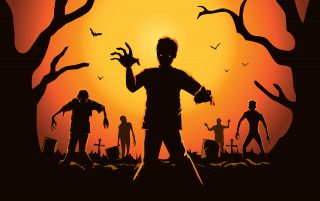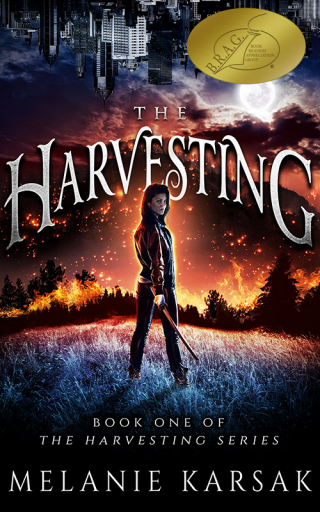By Melanie Karsak
It’s October, my favorite month of the year. Without fail, I always get in the mood to write something spooky this time of year. Over the summer, I completed the fifth and final book in The Harvesting Series. The Harvesting series begins with an outbreak that leads to a zombie apocalypse. Once mankind is mostly dead, the survivors learn that we weren’t as alone as we thought we were. The fey, vampires, and other supernatural creatures and powers always existed in our world, we just didn’t know it. Writing five books in a zombie series pushed me to constantly innovate and look for new ways to write scary creatures. Just how many ways are there to describe a zombie? In the end, I found the best was to go back to basics. Hit the readers right in the senses:
1) Zombies smell like…
I spent a lot of time considering how a zombie might smell. From the harrowing bouquet of the rotted corpse to the whiff of an entire horde of the decaying undead, zombies stink. When writing zombies, you will get your readers into the scene more completely if you can help them envision what it would be like face-to-face with breath that smells like the “soup” at the bottom of a trash can. On The Walking Dead, characters can grimace and cover their mouths. Our characters should do that too, but describing the scents of rancid, pussy sores, molding clothing, and maggot-filled chunks of bloody flesh can bring your zombies to…life? Zombies should smell so bad you can taste it. Speaking of…
2) Zombies taste like…
Okay, no one is going to go around and taste a zombie, but you should get the reader’s taste buds thinking. My favorite taste description is of the bloody saliva my zombies drool all over everything. Imagine that sharp salty and metallic taste of blood in your mouth. Imagine the wash of stomach acid that will burn up your esophagus and into your mouth when you see one of my stinking zombies. Image a scent so putrid you can taste it. Yes, zombies taste bad too.
3) I hear zombies…
The groan of the undead, the sound of them dragging their body parts down the street behind them, the spitty hiss they make as their decayed teeth, yellowed and full of pulpy bits of bloody flesh, snap as they try to bite you, all make up the beautiful chorus that is the zombie apocalypse. Zombies moan like no other monster. Their terrible hunger evokes painful sounding moans as they hiss and snap at their meal: you. The zombie really makes a music all its own.
4) Zombies feel like…
Imagine a rotted corpse had just lunged at you. You try to push it away find only pulpy, decayed flesh. Your fingers sink into the meat. The skin peals back like the casing of a sausage to reveal rotted sinew and tissue now softer than mud. The decaying flesh slips off the still-solid skeleton underneath until your down to the very bone. Zombies feel gross. Describing how zombies feel is best imagined as that feeling you get when you reach into a bag, box, or cupboard only to find something wet, soft, and suspect—where it shouldn’t be. If you have kids, you’ve experienced this for sure. You’re immediately repulsed by the unknown. Add in some great taste and smell descriptions, and you have a perfect recipe for the grotesque.
5) Zombie look like…
Describing how a zombie looks is where writers can take the most liberties. Are your zombies fast or slow? Do they decay or do they not? It’s pretty standard fare to have zombies in tattered clothes, from I am Legend’s thinking and hairless undead to 28 Days Later’s fast zombies, a bad wardrobe is the norm. Zombies can have red eyes, black eyes, white or decayed-looking eyes, or more. You zombies might be able to communicate or even seem more human than undead. Playing with just what your special brand of zombie will look like, and making is as scary as possible, is what makes writing zombies entertaining.
Evoking the senses when trying to scare the reader is really fun—and maybe a little evil—way to pull the reader into the moment and get their hearts racing. The best way to imagine what will be scary to the reader, what will repulse and frighten them, is to question what you find repulsive and frightening. Play on common human fears. Manipulate the fears of the dark, unknown sounds, and all manner of deeply held unconscious worries.
Of course, I didn’t write a zombie dressed as a clown spitting out spiders while giving a speech, but if I did, he definitely would have smelled like rancid meat, his entrails falling out of a fresh wound as he tried to claw off some poor innocent’s face with his yellowed fingernails, pressing those boney fingers into their flesh. I didn’t write that scene…yet.


It was good and helpful
Exceptional detail given here. Two thumbs up! I feel inspired for my own “zombie book”.
Thank you so much this will really help with my creative writing in class. Thanks again.
What does it mean to ‘write like Zombies’?
Your suggestions certainly are helpful for writers of fiction. What would you do differently in a zombie/western screenplay?
I love this article thank you!
Your article was amazing so inspiring thank you!
I find this very helpful and inspiring for my creative writing. Thank you.
This was very helpful with my story! I felt it was bland before, but after some revising with these tips in mind, I like it a lot more!